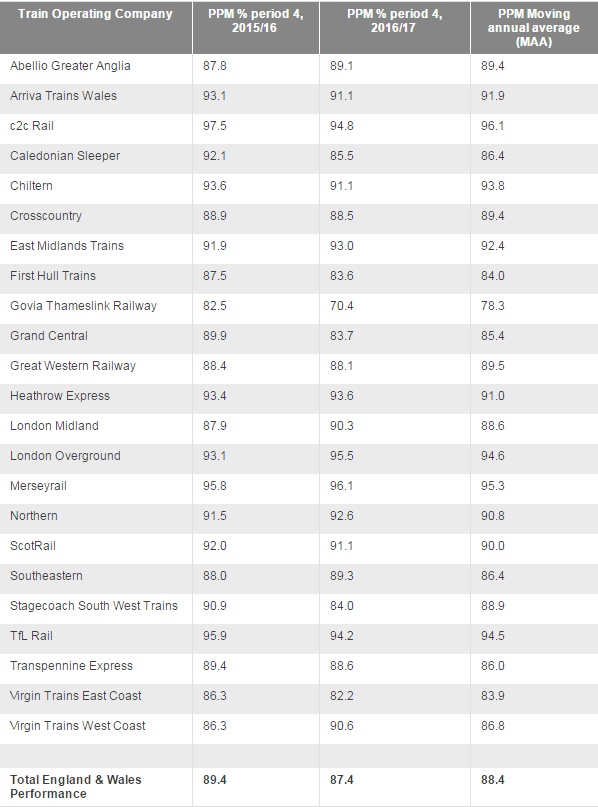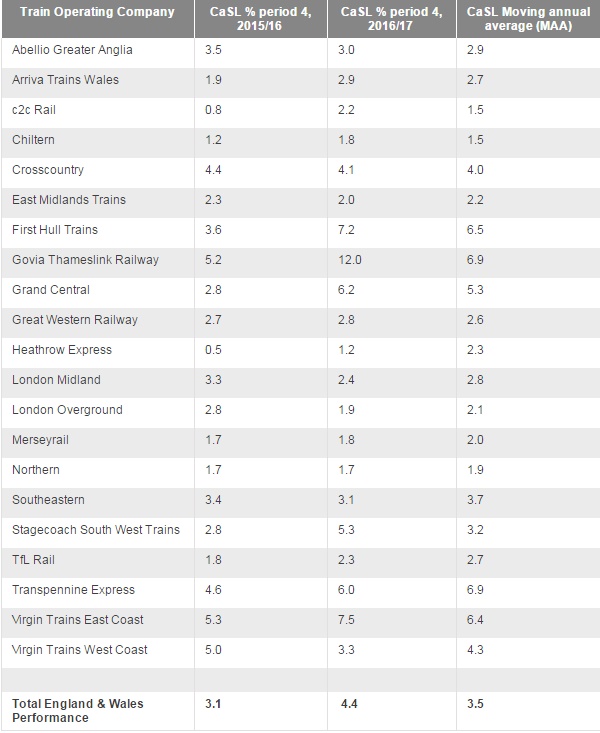02.08.16
GTR PPM recovers in P4, but still below other companies
Govia Thameslink Railway (GTR) had the worst performance and punctuality measure (PPM) score of all UK rail companies for the third month running, although it has slightly recovered from last month.
GTR’s PPM was at 70.4% in 26 June – 23 July (period 4), a 17% decrease from 82.5% at the same point last year. Its PPM was at 78.1% in period 2 and 66.8% in period 3.

Furthermore, 40% of the delays were judged by Network Rail to be caused by GTR, higher than any other cause.
The ongoing delays are thought to be largely due to problems on the Southern franchise, which GTR took over last year.
Last month, Southern cancelled 341 services a day in a bid to restore order to the franchise, which has been hit by unpredictable delays because of factors including engineering works at London Bridge and strikes and staff absences linked to an ongoing dispute with RTM.
London TravelWatch has recommended that Transport for London temporarily takes over the Southern franchise if the services are not restored within a month.
After GTR, the companies with the biggest drop in PPM were Stagecoach South West (a 7.5% drop from 90.9% to 84%) and Caledonian Sleeper (a 7.1% drop from 92.1% to 85.5%).
GTR also had the highest rate of journeys ending in cancellation and significant lateness (CaSL) at 12%, significantly ahead of the company with the next highest rate (Virgin East Coast at 7.5%).

The figures show that delays on the UK rail network as a whole are worse than they were last year. The total PPM was 87.4%, a drop from 89.4% last year, and total CaSL was at 4.4%, an increase from 3.1% the year before.
RTM contacted GTR for a statement but it did not respond at the time of publication.
12.10pm UPDATE
A GTR spokesperson said: "It was another very challenging period for GTR and a frustrating one for our passengers. Punctuality performance has been affected in the main by the continuing train crew availability issues and infrastructure problems.
"Before 11th July, Southern services were beset by an unprecedentedly high level of conductor sickness and a reluctance to work overtime by train crews. This situation existed since the RMT launched industrial action over our plans to improve customer service on-board our trains by evolving the role of the conductor. This meant that in addition to a list of pre-cancelled trains, we were being forced to cancel trains on an ad-hoc basis, seriously affecting our ability to provide a robust and reliable train service on a day to day basis. This was bringing punctuality performance down to unacceptable levels and left our passengers unable to plan their journeys with confidence.
"On 11th July, we introduced a temporary weekday revised timetable to reduce the impact of these daily cancellations. This timetable was designed to give the majority of our passengers a better, more consistent service, enabling to plan their journeys to and from work with more confidence.
"In its first week, the timetable worked well, achieving the aims we set out to do. Unfortunately, the following week was beset with a mixture of major infrastructure failures and speed restrictions imposed by Network Rail due to high temperatures. The main infrastructure issues to note were a collapsed sewer underneath the tracks at Forest Hill which created a large hole which blocked the line between East Croydon and London Bridge for two days and a major signal failure at Gatwick Airport on the Brighton Main Line which led to major disruption on the line.
"When there are no problems on the railway infrastructure, we are finding that the temporary timetable is working well, getting our passengers to where they need to be at the time they expect to arrive."
(Image c. Rui Vieira from PA Wire)
Have you got a story to tell? Would you like to become an RTM columnist? If so, click here.